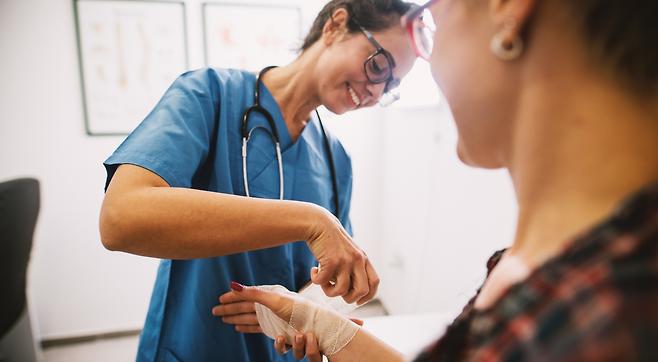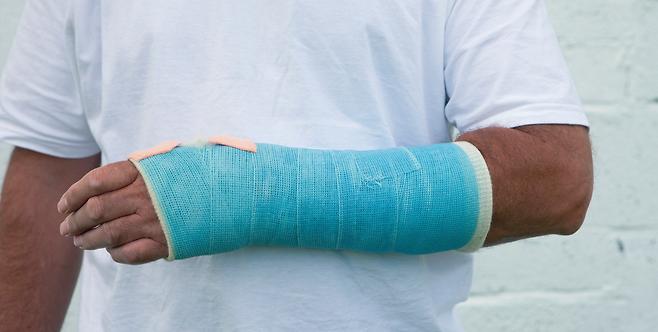
Reasons to Visit Urgent Care
Feb 08, 2021 | Urgent Care | Share:
When you have an urgent medical need such as a wound, a broken bone, or an infection, your first impulse may be to go to the emergency room. And while the ER is an important source of medical care for true emergencies, many medical issues can be treated at an urgent care clinic near you. We’ve developed a guide to help you decide whether or not your urgent medical need can be treated at an urgent care clinic, or if you should go directly to the ER.
When you should go to the ER
The emergency room is for true medical emergencies. If you have any of the following symptoms, you should go straight to the ER or call 911.
- You’re experiencing chest pain, especially on the left side. Your chest pain may also be accompanied by lightheadedness, jaw, neck, or back pain, or pain in your left arm.
- You’re in respiratory distress and are short of breath
- You’re experiencing symptoms of a stroke. Stroke symptoms include:
- Facial drooping or numbness
- Arm weakness
- Slurred or difficult to understand speech
- Difficulty seeing in one or both eyes
- Sudden dizziness or difficulty walking
- Sudden severe headache with no known cause
- You’ve experienced a seizure or loss of consciousness
- You’ve experienced physical trauma or have had a serious head injury
- You’re bleeding uncontrollably
- Your life or your limb is in danger
If you don’t have any of the above symptoms, read on to learn how an urgent care clinic can treat your medical needs.

Urgent Care for Wounds
Wounds happen. Whether you’ve hurt yourself doing work around the house or you’ve had a less-than-friendly encounter with an animal, you may find yourself in need of urgent care for a wound. While many small wounds heal on their own with basic first aid, some wounds require medical attention.
Cuts and lacerations
If you’ve ever cut your finger with a sharp knife or stepped on a nail during a DIY project, you know that some cuts just can’t be treated at home. How do you know if your wound needs more than just a band-aid and some antibiotic ointment? You should visit urgent care for your cut if:
- You can’t stop your wound from bleeding, even with pressure
- Your cut has jagged edges that won’t come together when pressed
- Your wound was caused by something dirty or rusty (like a rusty nail)
Animal bites
Animal bites are a specific type of wound that needs medical attention. Unfortunately, animal bites do happen - whether the bite is from a dog, a cat, or a wild animal. You should visit urgent care for an animal bite if:
- The bite punctures the skin and draws blood
- You’ve been bitten or scratched by a dog or cat that you don’t know
- You’ve been bitten by a wild animal
- If the area around the bite is red, swollen, or oozing fluid
Your urgent care doctor can determine whether or not you need stitches, DermaBond, antibiotics, or even a tetanus shot to properly care for your wound.
When to go to the ER for your wounds
Some wounds need to be treated in the emergency room. You should go to the emergency room for your wound if:
- Your wound is spurting blood
- Bone, muscle, or fatty tissue is exposed
- The wound is more than ¼” deep
- The wound is located across a joint
- The wound is on your face and may need specialty care to avoid scarring
Urgent Care for Infections
No one wants to deal with an infection, and most infections require some kind of medical intervention. Fortunately, the urgent care clinic is a great place to go for most common infections. Urgent care doctors specialize in general medicine, so they’re prepared to treat infections that affect your various body systems.
Pink eye
Pink eye, also known as conjunctivitis, is a common infection that affects both children and adults. It is contagious and can spread easily, so if you think you have pink eye, it’s a good idea to see a doctor. Symptoms of pink eye include:
- Redness or pink tone to the white of your eye
- Swollen eyelids
- Increased tear production or watery eyes
- Feeling like you have something in your eye
- Itchy or burning eyes
- Eye discharge that can sometimes cause your eyelids to stick together
- Inability to wear contact lenses
At MedHelp, you also have the option to have a virtual doctor’s visit for pink eye through our telehealth service. With treatment, symptoms of pink eye usually go away quickly.
Earache
Earaches aren’t just for kids. While ear infections are especially common in young children, adults can get ear infections, too. Outer ear infections (otitis externa), also known as swimmers’ ear, are infections of the outer ear canal. Middle ear infections (acute otitis media) are the most common type of ear infections and affect the middle of the ear. Middle ear infections often happen as a result of another sickness like a cold, the flu, or allergies. Symptoms of an ear infection include:
- Redness or itchiness in your ear
- Ear pain that lasts longer than a day
- Pus or fluid draining from your ear
- Difficulty hearing
- Fever higher than 100 degrees
While many ear infections will clear up on their own, some ear infections do need antibiotics to heal. Your doctor will determine the best course of treatment for your ear infection.
Urinary Tract Infections
A urinary tract infection (UTI) always needs medical attention. This isn’t an infection that will just go away on its own. Left untreated, a UTI can lead to other, more serious medical complications. You should visit urgent care for a UTI if you have the following symptoms:
- Burning or stinging sensation while urinating
- Cloudy, reddish, or strong-smelling urine
- A frequent urge to urinate
- Abdominal or lower back pain
- Fever higher than 100 degrees
When you visit your urgent care doctor for a urinary tract infection, your doctor will take a urine sample (urinalysis) to check for bacteria in your urine. If bacteria are present in your urine, you’ll be prescribed an antibiotic to clear up your infection.
Sinus Infections
Sinus infections often occur after you’ve had a bad cold. When sinus pain and pressure persist after your other upper respiratory symptoms have gone away, you may have developed a sinus infection. While some sinus infections will go away on their own, some sinus infections will require medical treatment. Symptoms of sinus infection include:
- A recent cold
- Sinus pain or pressure
- Severe congestion
- Green or yellow nasal discharge
- Sore throat
- Fever
You should go to urgent care for your sinus infection symptoms when symptoms begin to improve, but then get worse again. Alternately, if you’ve had symptoms for more than 10 days or fever for 3 or more days, you should visit your doctor. Your doctor can determine whether your sinus infection will go away on its own or whether you may need antibiotic treatment.
When should you go to the ER for an infection?
Most infections can be treated easily at an urgent care clinic. But if you’re experiencing any of the following symptoms with your infection, you should go to the ER:
- Loss of vision
- Difficulty balancing
- Difficulty breathing
- Extreme pain
- Extreme drowsiness or fatigue (cannot stay awake)

Urgent Care for Injuries
Injuries can be unavoidable. But as long as your life or limb is not in danger, you can avoid going to the ER for your injury. Most common injuries that need medical attention can be treated at an urgent care clinic.
Sprains and Strains
Whether you’ve tweaked an ankle playing pick-up football or had a nasty fall and think you’ve sprained your wrist, it’s hard to know whether you need to see a doctor for your injury. Do you just ice it and take ibuprofen, or do you need to get an x-ray? Most strains and sprains can be treated at home. But you should visit urgent care for a strain or sprain if:
- Pain, swelling, or bruising worsens despite treatment
- You experience pain, numbness, discoloration, or coldness at the location of your sprain or strain
- You can’t put weight on the joint
- You hear a popping sound at the time of injury
- New, unexplained symptoms develop
Some sprains need to be immobilized in a cast, boot, or brace. Your doctor may also recommend strengthening and stretching exercises to regain strength and range of motion.
Broken bones
If you think you might have broken a bone, you definitely need to visit an urgent care clinic near you. Broken bones are designed to heal themselves, so you need medical attention to ensure that your bone heals properly and in the correct place. MedHelp clinics are equipped with advanced x-ray technology to properly diagnose your break and determine the best course of treatment. We can also split and cast at our clinics, and we’ll provide a surgical referral for you only when it’s necessary.
Concussion
Concussions often happen as a result of a sports injury, but they can also happen from a fall or significant bump to the head. Concussions are the most common type of traumatic brain injury, and it can be difficult to know what to do if you’ve hit your head. If you’re experiencing any of the following symptoms after hitting your head, you should visit an urgent care doctor today:
- Headache
- Feeling confused or experiencing “brain fog”
- Nausea or vomiting
- Dizziness or difficulty balancing
- Double vision or blurry vision
- Light or noise sensitivity
- Difficulty with coordination
When you visit your urgent care doctor, your doctor will ensure that you’re safe and don’t need further medical treatment for your concussion.
When to go to the ER for an injury
Not all injuries should be treated at an urgent care clinic. You should go immediately to the ER for an injury if:
- Your bone is protruding from the skin
- You believe more than one bone is broken
- Your injury is disfigured or bent in an unnatural way
- After a head injury, you have:
- One pupil larger than the other
- Drowsiness or you cannot wake up
- Slurred speech or numbness
- Lost consciousness
- Increased confusion, irritability, or restlessness
- Seizures or convulsions
- A headache that will not go away
Urgent care for Skin Issues
Did you know that skin is your largest organ? When you have uncomfortable issues affecting your skin, it can be difficult to know whether you need to seek medical attention or whether you can treat your issues with at-home first aid.
Rashes
Whether you’ve had a nasty run-in with some poison ivy while camping or you’ve developed an itchy allergic reaction to something, rashes are never fun. Rashes caused by poison ivy and poison oak will often go away on their own, but sometimes the itching or pain is so severe that you need to see a doctor. Other rashes such as impetigo may also need the attention of a doctor. You should visit urgent care for your rash if you have the following symptoms:
- Intolerable itchiness or pain that won’t go away with topical or over-the-counter treatments
- Blisters that leak or look crusty
- Swelling at the site of your rash
- Hives
When you visit your urgent care doctor for a rash, your doctor will first determine what type of rash you have. You may need a prescription ointment or oral medication to help you manage your symptoms. If you have a bacterial rash such as impetigo or a fungal rash such as impetigo, you’ll need an antibiotic or antifungal medication to clear up your rash.
Cellulitis
Cellulitis is a common skin infection that occurs when bacteria enter through a break or crack in the skin. Cellulitis should never be left untreated because the infection can spread and cause more serious medical complications. Symptoms of cellulitis include:
- Red, blotchy, streaky, or swollen skin
- Skin that is tender or warm to the touch
- Pain at the site of the infection
Your urgent care doctor will examine your skin and may drain the site of your infection. You’ll also receive a prescription for antibiotics to clear up your infection. Your urgent care doctor may need to try multiple antibiotics for your infection to go away.
Burns
Mild to moderate first or second-degree burns can be treated at an urgent care clinic, but more severe burns need emergency attention. Visit urgent care for your burn if you have the following symptoms:
- Red, dry burn with no blisters (first-degree burn)
- Red or blistered burn that is swollen or painful (second-degree burn)
- If you suspect your minor burn may be infected. Indications of this include longer-than-expected healing time, increased pain, or tenderness and warmth at the site of the burn.
Your urgent care provider can evaluate your burn and determine whether you need treatment.
When should you go to the ER for skin issues?
While many skin issues can be treated at an urgent care clinic, you should go to the ER if you have any of the following symptoms:
- Fever greater than 102 degrees
- Rash with difficulty breathing or swallowing
- A rash that covers most of your body
- Any skin issue that occurs on your face or genitals
- Third or fourth-degree burns
- Any type of burn that covers more than 10% of your body
- Any burn that occurs on a major joint (like a knee, elbow, or finger)
- Chemical or electrical burns

Urgent Care for Respiratory Illnesses
During the COVID-19 pandemic, you must get tested if you are exhibiting any symptoms of COVID-19. Before the pandemic, it was fine to take a wait-and-see approach to colds and the flu. Now, you should get tested right away to mitigate spread. If you have any of the following symptoms, you should get tested for COVID-19:
- Fever
- Cough
- Shortness of breath
- Fatigue
- Body aches
- Headache
- Sore throat
- Congestion or runny nose
- New loss of taste or smell
At MedHelp, we offer drive-through testing with results in about 30 minutes. Your doctor may also recommend that you get a flu test when you get your COVID-19 test. We can provide virtual treatment through telehealth visits for patients who test positive for COVID-19. For patients who test negative, we can provide treatment inside our clinic.
When should you go to the ER for cold, flu, and COVID-19 symptoms?
If you’re experiencing any of the following symptoms, you should go to the ER:
- Difficulty breathing, especially while at rest
- Blue lips or face
- Severe chest pain
- Confusion or disorientation
Urgent Care for Abdominal Issues
Most stomach issues go away on their own. Whether something you’ve eaten just doesn’t agree with you or you’ve had a bout of diarrhea, these stomach issues are normal and clear up with home care. But some abdominal issues need medical attention.
Abdominal pain
Stomach pain can be disruptive, and it can be caused by many different issues such as IBS, menstrual cramps, indigestion, or constipation. To determine the cause of your stomach pain, you may need to visit an urgent care doctor. You should visit your urgent care doctor if you have any of the following symptoms:
- Mild to moderate stomach pain that doesn’t go away on its own after a day or two
- Stomach pain accompanied by a fever of greater than 100 degrees
- Pain or discomfort when you eat
- Pain when using the restroom
- Blood in your urine or stool
After discussing your symptoms, your doctor can determine the cause of your stomach pain and recommend an appropriate course of treatment. Your doctor may need to refer you to a gastroenterologist for more complicated cases.
Vomiting and diarrhea
Most cases of vomiting and diarrhea go away on their own without medical care. Occasionally, you should visit your urgent care doctor for vomiting and diarrhea if you have the following symptoms:
- Diarrhea that lasts longer than three days
- Extreme pain and cramping
- You cannot keep down clear liquids
- You think you might be dehydrated
Your urgent care doctor may prescribe medications to control your nausea or diarrhea to help you rehydrate.
When should you go to the ER for abdominal issues?
Some abdominal issues need emergency treatment. You should visit the ER for your stomach troubles if you have any of the following symptoms:
- Your abdomen is hard or tender to the touch
- Your vomit or diarrhea is bloody
- Your abdominal issues are accompanied by dizziness, fainting, changes in your vision, or difficulty breathing
- You’re vomiting but cannot have a bowel movement
You may be surprised at the range of medical care you can get at an urgent care clinic. Next time you need urgent care for an illness, infection, or injury, consider visiting a MedHelp Urgent Care clinic near you.
Because illnesses and injuries never take the day off, MedHelp Clinics are open seven days a week with extended hours on weekdays. Walk-ins are always welcome for urgent care visits.